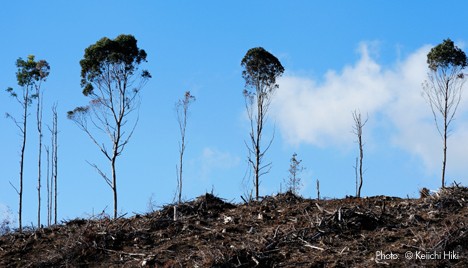This morning, in distant Tasmania, an intrepid group of young protesters defied Taib’s family company Ta Ann.
They boarded a boat laden with wood that Ta Ann had taken from their own primary jungle, climbed right to the top of a crane tower and chained themselves to it.
And they wanted to make their message clear. They were not only fighting to protect their own rare jungle from the short-sighted and greedy plunder of the already fabulously wealthy Taib Mahmud, they were standing in solidarity with the people of Sarawak.
This was the statement by the Huon Valley Environment Centre’s Jenny Webber:
“Today’s protests on Hobart’s waterfront was taken by Huon Valley Environment Centre to highlight Ta Ann’s continual disregard for not only Tasmania’s wild forests but the indigenous people of Sarawak”
Taib’s global reach is making him internationally notorious
The campaign in Tasmania against Ta Ann is a sign of the developing international international awareness of Taib Mahmud. The people of Sarawak were the first to suffer from his greedy pact with the timber tycoons to strip the forests bare. However with most of Sarawak’s own forests now logged out, he and his cronies have spread their tentacles abroad, engaging in plunder across the world’s few remaining areas of virgin jungle. Tasmania is developing a strong movement to prevent that happening.
Ta Ann is run by Taib’s cousin and well-known proxy, Hamid Sepawi, who also owns over a third of the shares in what is billed as a public company. Onlookers were astonished when the multi-million dollar concern managed to get a grant from the Australian government to invest in a wood veneering factory in Tasmania, which it was hoped would breath life into a struggling industry.
Questions are still being asked over why the Australian government would PAY Taib’s company to strip their forest? The Green Party says no satisfactory answer has been provided so far.
However, the promise Ta Ann made when it opened the project was that the factory would rely on plantation forests and not extract wood from Tasmania’s remaining high conservation value forests – its primary jungle. However, environmentalists say that the factory managers are now saying that the quality of the plantation wood is not sufficient for their factory and they are demanding hardwood from the jungle.
According to Jenny Weber:
“The Tasmanian Government and Ta Ann are locking in the logging of native forests to meet a wood supply contract till 2027. High Conservation value forests are being lost to feed Ta Ann’s mill, when they should be in a moratorium now”.
Worse, the environmentalists say Ta Ann are now putting the Tasmanian authorities under pressure to provide them with access to primary jungle hardwood until 2042!

Powerful political links protecting Ta Ann
Despite the outrage of many local people in Tasmania and also the overwhelming view of Australians that all logging of primary jungles should be stopped, the Taib company has developed powerful political links in Australia’s remotest region. Logging is an old and outdated industry in Australia, but there is still a strong lobby which is attempting to keep it going.
Therefore, protests and actions like the one today are being met with strong arm tactics and contempt by the authorities. Ugly gangs of loggers have been allowed to threaten the mainly youthful demonstrators directly on a number of occasions. Protesters say these gangs are not being restrained, while their peaceful protests are treated as if they are behaving violently.
Show of defiance
In response to the growing concern about Ta Ann and the rising level of protests around Tasmania’s port areas, earlier this year the Tasmanian Port Authority announced a 50 metre exclusion zone around all vessels exporting wood chip and veneer. It was an attempt to prevent protest actions from holding up Ta Ann’s exports.
Today’s action was a gesture of defiance proving that despite such restrictions a group of of protesters were still able to board a Ta Ann boat and delay its passage.
The group of mainly young women were appallingly treated. The authorities debased themselves by strip-searching them and confiscating their film, as if they were criminals rather than concerned citizens representing the views of the majority of people in their country. One of the group remains in custody.
There is a danger that such hard-line tactics against protesters by the authorities in Tasmania will create an even stronger sense of solidarity between them and the beleaguered indigenous people of Sarawak. The breaking down of blockades and the brutal beatings by gangs has not lessened the anger of the Penan and the other tribes, who have lost their forest lands in Borneo.
Likewise, similar treatment will not lessen the anger of the young people of Tasmania, who can see that the wealth of their forests is being stripped to even further enrich the greedy and ruthless Taib family, along with their business allies.
[slideshow]

